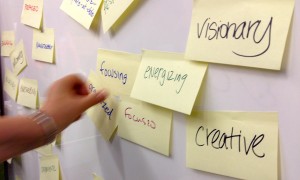This piece was written in recognition of Earth Day, April 22, 2015, by Hera Hub member Ellen Kappes, a Sustainability Coach with REV, which aims integrate the best of sustainability with behavior change to accelerate business impact. Ellen also has an MBA focused on Sustainability.
As members of Hera Hub, a co-working space for women entrepreneurs, most of us are doing business on a relatively small scale compared to the Walmarts, Qualcomms, and Patagonias of this world. Our business is growing at a warp speed or we are laser focused on securing our next gig. We struggle to manage our cash and most importantly our time and sanity. Incorporating sustainability into our business model and operations is often very low on our priority list and we may feel that it is something best left until later – when we have scaled up, when we are a more established business.
 Like many of you, I spent the bulk of my career at larger, well-resourced organizations. That was before being environmentally and socially responsible was even a focus for most large corporations. For the last two years, I have taken a different direction working as a Sustainability Coach for an early stage company called REV. REV runs Sustainability Circles® — a peer learning program aimed at small and medium-size organizations. Over a six-month program, I facilitate workshops with expert speakers and provide one-to-one coaching to up to 10 organizations as they each develop a Sustainability Action Plan designed to engage their stakeholders (customers, employees, suppliers, community), make their businesses more resource efficient, and save them money. Although the Sustainability Circles generally are geared toward businesses larger than “solopreneur” businesses, I have learned that embedding sustainability into any size business early on will pay off significantly even in the short term.
Like many of you, I spent the bulk of my career at larger, well-resourced organizations. That was before being environmentally and socially responsible was even a focus for most large corporations. For the last two years, I have taken a different direction working as a Sustainability Coach for an early stage company called REV. REV runs Sustainability Circles® — a peer learning program aimed at small and medium-size organizations. Over a six-month program, I facilitate workshops with expert speakers and provide one-to-one coaching to up to 10 organizations as they each develop a Sustainability Action Plan designed to engage their stakeholders (customers, employees, suppliers, community), make their businesses more resource efficient, and save them money. Although the Sustainability Circles generally are geared toward businesses larger than “solopreneur” businesses, I have learned that embedding sustainability into any size business early on will pay off significantly even in the short term.
Five Reasons Why Sustainability Makes Sense for Small Business
- Sustainability concepts naturally align with the core values of most entrepreneurs and therefore can easily be embedded in a start up business. Sustainability is all about solving problems and operating resource efficiently with an eye toward ongoing future prosperity. The passion to succeed, creative problem-solving skills, and lean operating practices that come naturally to most entrepreneurs align seamlessly with an embedded sustainability strategy.
- Engagement at the early stages of a business will build a culture and competitive position that will be harder to create later on. Operating more sustainably sends a message to your customers, suppliers, employees, and potential investors that you care about the integrity of your business, and are taking a holistic approach that is both economically and socially responsible. Building this into our brand from the beginning gives us a competitive advantage and is easier to accomplish early on as opposed to when the company is already well established.
- Baby steps matter and the “spill-over effect” of acting on a personal level will ultimately yield exponential benefits. Employees who see their bosses “doing the right thing” are likely to model those behaviors, and be more productive and loyal to the company. So whether it is avoiding the use of single-use/disposable products (cups, plastic bags, and plastic water bottles) or planning to carpool to a client meeting, your behaviors will encourage others to act more sustainably. These kinds of simple, no cost behavior changes can add up to substantial benefits over time.
- Formalizing sustainability goals early on will ensure that you make good on your intentions and will force you to build organizational capacity.
 Try to measure your company’s environmental and social impacts early and often, so that your can set goals, develop a plan, and identify resources that will allow you to execute on those goals. Does this sound familiar? Operating your business more sustainably requires the same discipline as building any other part of your business. It doesn’t happen by itself. This can be challenging since we are often so focused on the day-to-day operations of our business and its immediate cash needs, that we fail to do any kind of planning that will build organizational capacity.
Try to measure your company’s environmental and social impacts early and often, so that your can set goals, develop a plan, and identify resources that will allow you to execute on those goals. Does this sound familiar? Operating your business more sustainably requires the same discipline as building any other part of your business. It doesn’t happen by itself. This can be challenging since we are often so focused on the day-to-day operations of our business and its immediate cash needs, that we fail to do any kind of planning that will build organizational capacity.
- Time spent identifying sustainable solutions fosters creativity and innovation. Taking the extra time to research more sustainable options or making a financial investment in sustainable initiatives often has a domino effect. This is especially true if problem solving is a collaborative endeavor amongst the whole team. Finding solutions to problems can be contagious!
So spend a little time with your team this Earth Day to begin the discussion about how your business can start down the Sustainability path. It will be a journey worth taking.
______________________________________________________________
 Ellen Kappes has an MBA focused on Sustainability and deep knowledge of triple bottom line management, sustainable business strategies, corporate social responsibility (CSR) reporting, and stakeholder management. As a Sustainability Coach with REV (revsustainability.com), she also draws on a 15-year career in finance and accounting to support clients in establishing baseline benchmarks, setting goals, evaluating project paybacks, engaging stakeholders, and evaluating and reporting results. Since 2011, Ellen has served as a Commissioner on the City of Chula Vista’s Resource Conservation Commission and has been an Ambassador at Hera Hub since 2013.
Ellen Kappes has an MBA focused on Sustainability and deep knowledge of triple bottom line management, sustainable business strategies, corporate social responsibility (CSR) reporting, and stakeholder management. As a Sustainability Coach with REV (revsustainability.com), she also draws on a 15-year career in finance and accounting to support clients in establishing baseline benchmarks, setting goals, evaluating project paybacks, engaging stakeholders, and evaluating and reporting results. Since 2011, Ellen has served as a Commissioner on the City of Chula Vista’s Resource Conservation Commission and has been an Ambassador at Hera Hub since 2013.






